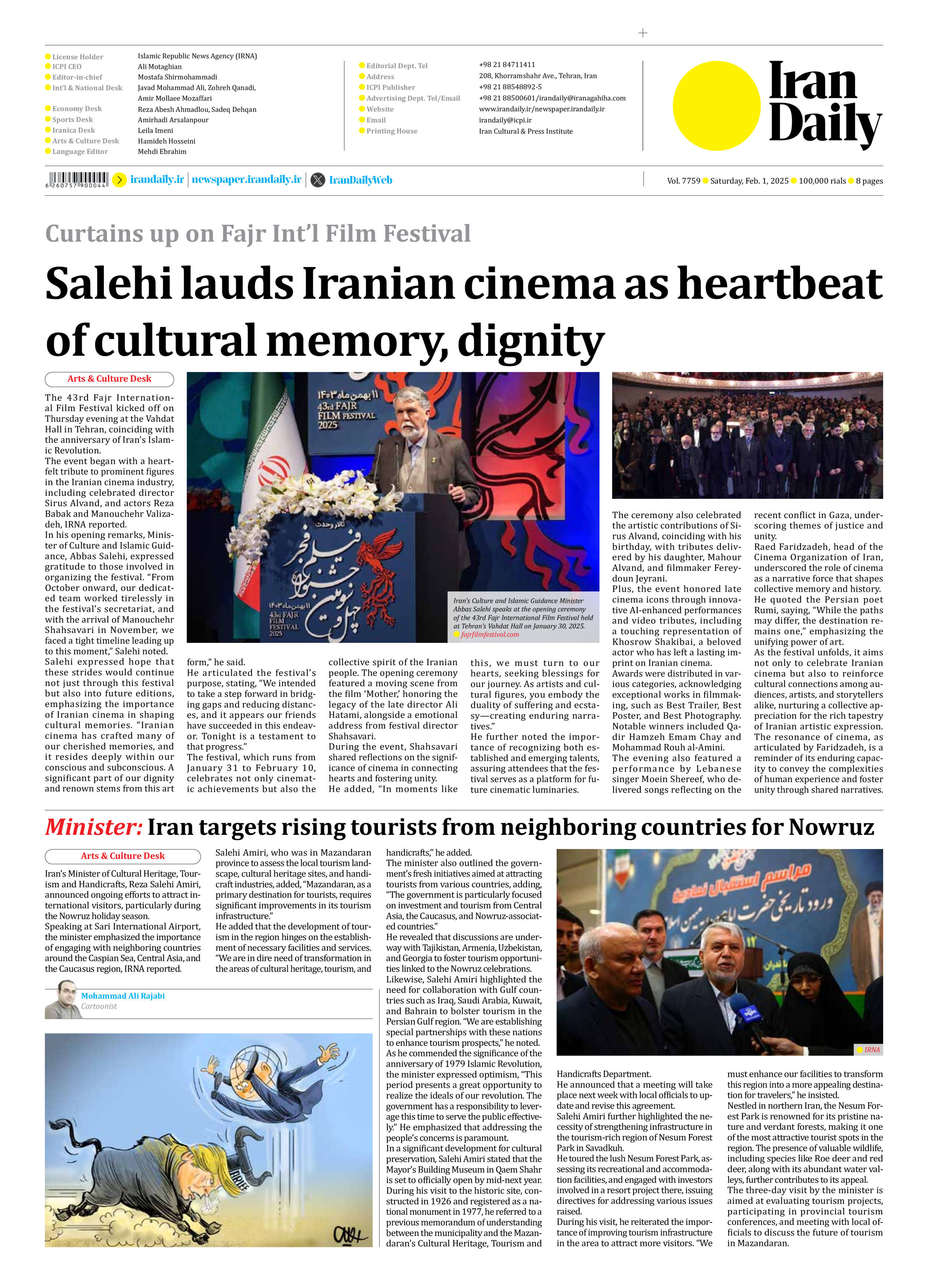
Curtains up on Fajr Int’l Film Festival
Salehi lauds Iranian cinema as heartbeat of cultural memory, dignity
The 43rd Fajr International Film Festival kicked off on Thursday evening at the Vahdat Hall in Tehran, coinciding with the anniversary of Iran’s Islamic Revolution.
The event began with a heartfelt tribute to prominent figures in the Iranian cinema industry, including celebrated director Sirus Alvand, and actors Reza Babak and Manouchehr Valizadeh, IRNA reported.
In his opening remarks, Minister of Culture and Islamic Guidance, Abbas Salehi, expressed gratitude to those involved in organizing the festival. “From October onward, our dedicated team worked tirelessly in the festival’s secretariat, and with the arrival of Manouchehr Shahsavari in November, we faced a tight timeline leading up to this moment,” Salehi noted.
Salehi expressed hope that these strides would continue not just through this festival but also into future editions, emphasizing the importance of Iranian cinema in shaping cultural memories. “Iranian cinema has crafted many of our cherished memories, and it resides deeply within our conscious and subconscious. A significant part of our dignity and renown stems from this art form,” he said.
He articulated the festival’s purpose, stating, “We intended to take a step forward in bridging gaps and reducing distances, and it appears our friends have succeeded in this endeavor. Tonight is a testament to that progress.”
The festival, which runs from January 31 to February 10, celebrates not only cinematic achievements but also the collective spirit of the Iranian people. The opening ceremony featured a moving scene from the film ‘Mother,’ honoring the legacy of the late director Ali Hatami, alongside a emotional address from festival director Shahsavari.
During the event, Shahsavari shared reflections on the significance of cinema in connecting hearts and fostering unity.
He added, “In moments like this, we must turn to our hearts, seeking blessings for our journey. As artists and cultural figures, you embody the duality of suffering and ecstasy—creating enduring narratives.”
He further noted the importance of recognizing both established and emerging talents, assuring attendees that the festival serves as a platform for future cinematic luminaries.
The ceremony also celebrated the artistic contributions of Sirus Alvand, coinciding with his birthday, with tributes delivered by his daughter, Mahour Alvand, and filmmaker Fereydoun Jeyrani.
Plus, the event honored late cinema icons through innovative AI-enhanced performances and video tributes, including a touching representation of Khosrow Shakibai, a beloved actor who has left a lasting imprint on Iranian cinema.
Awards were distributed in various categories, acknowledging exceptional works in filmmaking, such as Best Trailer, Best Poster, and Best Photography. Notable winners included Qadir Hamzeh Emam Chay and Mohammad Rouh al-Amini.
The evening also featured a performance by Lebanese singer Moein Shereef, who delivered songs reflecting on the recent conflict in Gaza, underscoring themes of justice and unity.
Raed Faridzadeh, head of the Cinema Organization of Iran, underscored the role of cinema as a narrative force that shapes collective memory and history.
He quoted the Persian poet Rumi, saying, “While the paths may differ, the destination remains one,” emphasizing the unifying power of art.
As the festival unfolds, it aims not only to celebrate Iranian cinema but also to reinforce cultural connections among audiences, artists, and storytellers alike, nurturing a collective appreciation for the rich tapestry of Iranian artistic expression. The resonance of cinema, as articulated by Faridzadeh, is a reminder of its enduring capacity to convey the complexities of human experience and foster unity through shared narratives.







